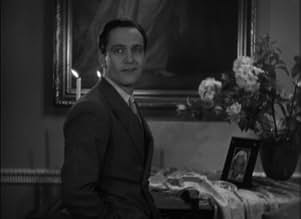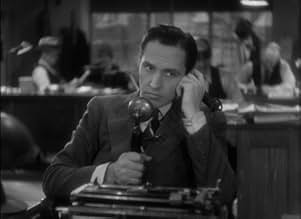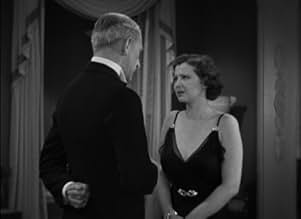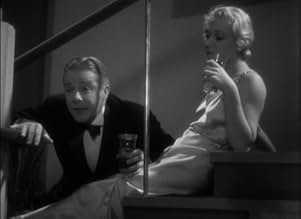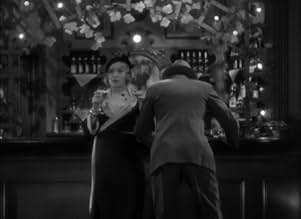NOTE IMDb
6,9/10
2,2 k
MA NOTE
Ajouter une intrigue dans votre langueA drunken newspaperman is rescued from his alcoholic haze by an heiress whose love sobers him up and encourages him to write a play, but he lapses back into dipsomania.A drunken newspaperman is rescued from his alcoholic haze by an heiress whose love sobers him up and encourages him to write a play, but he lapses back into dipsomania.A drunken newspaperman is rescued from his alcoholic haze by an heiress whose love sobers him up and encourages him to write a play, but he lapses back into dipsomania.
- Réalisation
- Scénario
- Casting principal
- Récompenses
- 3 victoires au total
Richard 'Skeets' Gallagher
- Buck
- (as Skeets Gallagher)
Ernie Adams
- Reporter
- (non crédité)
Mildred Boyd
- June
- (non crédité)
Edna Callahan
- Bridesmaid
- (non crédité)
Leonard Carey
- Prentice's Butler
- (non crédité)
Harry Cording
- Fred
- (non crédité)
Milla Davenport
- Prentice's Housekeeper
- (non crédité)
Avis à la une
***SPOILERS*** ***SPOILERS*** MERRILY WE GO TO HELL (Paramount, 1932), directed by Dorothy Arzner, is not a horror movie about Satan worshipers who hold Black Masses in Transylvania, as the title may indicate. It's is a story about an heiress names Joan Prentiss (Sylvia Sidney) who meets Jerry Corbett (Fredric March), a drunken newspaperman, on the rooftop during a party. Jerry's ambition is to become a successful playwright. Within a short time he falls in love with Joan, but Joan's father (George Irving) disapproves of Jerry because of his careless ways. He offers to buy Jerry out of marrying his daughter, but refuses to accept the $50,000. Quite happy that Jerry's sole interest is in his daughter, he gleefully approves of the upcoming marriage. During the wedding ceremony, Jerry, somewhat drunk, forgets the wedding ring and finds himself in an embarrassing situation by placing a beer tap on Joan's finger. Time passes. Jerry writes the comedy play, "When Women Say No," and it gets produced. The leading lady turns out to be Claire Hempstead (Adrienne Ames), Jerry's former girlfriend. While the play proves successful, Jerry's married life is not, especially when Joan finds he's spending more time with Claire as well with the booze. Not wanting to be an old-fashioned wife, Joan decides not to let this bother her by dating Charlie Baxter (Cary Grant), the leading man of the play, to society functions. Disgusted, Joan finally does leaves Jerry without telling him she's pregnant with his child. Old Man Prentiss tries his best to keep Jerry from visiting Joan in the hospital, where she's in danger of possibly losing either her life or baby.
The title, MERRILY WE GO TO HELL, happens to be the catch phrase used by March several times in the story before taking a drink. The movie in itself is forgotten with a familiar plot quite common during the Depression era. Film titles using "Hell" in it were also quite common practice during that time, until the production code people stepped in and put a stop to that, for the time being anyway. This romancer may be of some interest to film buffs today, especially seeing it being an early screen appearance by Cary Grant, in his third featured role. He is first seen (in long shot) wearing period costume and wig in Jerry's stage play opposite Adrienne Ames, and later at a social function in dinner clothes after the play's opening, before his character disappears. Sylvia Sidney does what she does best playing a long suffering girl, a kind of role she played from time to time, possibly because of her sweet and tender face. Before the end of 1932, Grant would elevate to becoming Sidney's co-star in one of her most tender movie roles, MADAME BUTTERFLY.
Also featured the cast of MERRILY WE GO TO HELL is Richard "Skeets" Gallagher as Buck, Jerry's reporter friend with a talent for tap-dancing, adding some amusing support during the film's serious moments; Kent Taylor as Gregory; and Florence Britton as Charlcie. Background music score includes "What a Little Thing Like a Wedding Ring Can Do" and "We Will Always Be Sweethearts," songs introduced in Paramount's 1932 musical hit, ONE HOUR WITH YOU starring Maurice Chevalier and Jeanette MacDonald.
In spite of good actors rising above somewhat average script, it's worth seeing as a curiosity on DVD (double featured with 1931's THE CHEAT), and on Turner Classic Movies (TCM premiere: September 1, 2020). If the story may not be an attention grabber, the title definitely is. (**)
The title, MERRILY WE GO TO HELL, happens to be the catch phrase used by March several times in the story before taking a drink. The movie in itself is forgotten with a familiar plot quite common during the Depression era. Film titles using "Hell" in it were also quite common practice during that time, until the production code people stepped in and put a stop to that, for the time being anyway. This romancer may be of some interest to film buffs today, especially seeing it being an early screen appearance by Cary Grant, in his third featured role. He is first seen (in long shot) wearing period costume and wig in Jerry's stage play opposite Adrienne Ames, and later at a social function in dinner clothes after the play's opening, before his character disappears. Sylvia Sidney does what she does best playing a long suffering girl, a kind of role she played from time to time, possibly because of her sweet and tender face. Before the end of 1932, Grant would elevate to becoming Sidney's co-star in one of her most tender movie roles, MADAME BUTTERFLY.
Also featured the cast of MERRILY WE GO TO HELL is Richard "Skeets" Gallagher as Buck, Jerry's reporter friend with a talent for tap-dancing, adding some amusing support during the film's serious moments; Kent Taylor as Gregory; and Florence Britton as Charlcie. Background music score includes "What a Little Thing Like a Wedding Ring Can Do" and "We Will Always Be Sweethearts," songs introduced in Paramount's 1932 musical hit, ONE HOUR WITH YOU starring Maurice Chevalier and Jeanette MacDonald.
In spite of good actors rising above somewhat average script, it's worth seeing as a curiosity on DVD (double featured with 1931's THE CHEAT), and on Turner Classic Movies (TCM premiere: September 1, 2020). If the story may not be an attention grabber, the title definitely is. (**)
Frederick March and Sylvia Sidney star in "Merrily We Go to Hell," from 1932.
For those of us who only remember Sylvia Sidney as an older character actress -- and usually a pretty mouthy one at that -- seeing her as an ingénue is always a revelation.
Jerry Corbett (March) is a reporter and a drunk, still pining for the woman who broke his heart, Claire (Adrienne Allen). When he meets the lovely Joan Prentice (Sidney) from a wealthy family, the two fall for one another and marry.
Jerry wants to write plays, and he eventually is able to have one produced, early in the marriage. Unfortunately, one of the stars is Claire, and she's perfectly willing to take up where they left off. Jerry starts drinking again. Joan is heartbroken as well as hurt and starts drinking and partying herself. Finally, though, she returns to her father's home.
Nothing too surprising in the plot, but good performances all around. Sidney is pretty and vulnerable, taking a chance on a man her father disapproves of but whom she loves. March shows that Jerry is a weak man who in his heart doesn't believe he deserves the happiness he's had with Joan. Can these two find their way back to one another? Just guess.
Dorothy Arzner had a good sense of pacing, so the film doesn't drag or slow down. Worth seeing for the actors, not necessarily the story.
For those of us who only remember Sylvia Sidney as an older character actress -- and usually a pretty mouthy one at that -- seeing her as an ingénue is always a revelation.
Jerry Corbett (March) is a reporter and a drunk, still pining for the woman who broke his heart, Claire (Adrienne Allen). When he meets the lovely Joan Prentice (Sidney) from a wealthy family, the two fall for one another and marry.
Jerry wants to write plays, and he eventually is able to have one produced, early in the marriage. Unfortunately, one of the stars is Claire, and she's perfectly willing to take up where they left off. Jerry starts drinking again. Joan is heartbroken as well as hurt and starts drinking and partying herself. Finally, though, she returns to her father's home.
Nothing too surprising in the plot, but good performances all around. Sidney is pretty and vulnerable, taking a chance on a man her father disapproves of but whom she loves. March shows that Jerry is a weak man who in his heart doesn't believe he deserves the happiness he's had with Joan. Can these two find their way back to one another? Just guess.
Dorothy Arzner had a good sense of pacing, so the film doesn't drag or slow down. Worth seeing for the actors, not necessarily the story.
Although this story has been done a million times since, Dorothy Arzner's subtle yet brash film still has something different to say which makes this worth watching.
Being not just that rarest of 1930s Hollywood creatures: a woman film maker but also someone in an openly long term same sex relationship I wonder whether she had to try harder than her male contemporaries? She certainly delivers goods with this, imbuing energy and emotion into this very thoughtful drama. It's not just a simple story about alcoholism as it could easily have been considering this is 1932. It is a surprisingly deep examination of a strained and complex relationship which is particularly insightful for the time. Above all though it is a piece of entertainment. Unlike how this subject might be handled today, it doesn't get too bogged down in depressing misery but instead keeps the story moving forward, keeping your eyes glued to the screen with a really fast pace.
It's not just Ms Arzner's energetic yet thought provoking direction which elevates this above a lot of the output from 1932, it's Frederick March. Sylvia Sidney is fine in this (not as good as she was in CITY STREETS, Rouben Mamoulian's masterpiece made a year earlier) but she and the rest of the cast are just not on the same level as Mr March. His characterisation of someone who knows he could have everything yet also someone who knows he is going to destroy not just his own but his wife's life too and someone who knows he can't do anything to stop himself is incredibly natural, authentic and heartbreaking. He achieves this, even when he's being decidedly horrible by being so endearing and likeable. Of all the actors the 30s, he was one who had real depth and demonstrates this fully here making his character both fun and sad, ambitious yet weak and spineless, devoted yet deceitful... a real person.
Despite my gushing praise for this, or maybe because of it, I can't call this a great film. Because it's good I can't just compare it with other films of that era but have to put it in the same category of all pictures from the last hundred years. It's no MIDNIGHT COWBOY or TRAIN SPOTTING thus my fairly low rating... but as films from 1932 go, it's one of the best.
Being not just that rarest of 1930s Hollywood creatures: a woman film maker but also someone in an openly long term same sex relationship I wonder whether she had to try harder than her male contemporaries? She certainly delivers goods with this, imbuing energy and emotion into this very thoughtful drama. It's not just a simple story about alcoholism as it could easily have been considering this is 1932. It is a surprisingly deep examination of a strained and complex relationship which is particularly insightful for the time. Above all though it is a piece of entertainment. Unlike how this subject might be handled today, it doesn't get too bogged down in depressing misery but instead keeps the story moving forward, keeping your eyes glued to the screen with a really fast pace.
It's not just Ms Arzner's energetic yet thought provoking direction which elevates this above a lot of the output from 1932, it's Frederick March. Sylvia Sidney is fine in this (not as good as she was in CITY STREETS, Rouben Mamoulian's masterpiece made a year earlier) but she and the rest of the cast are just not on the same level as Mr March. His characterisation of someone who knows he could have everything yet also someone who knows he is going to destroy not just his own but his wife's life too and someone who knows he can't do anything to stop himself is incredibly natural, authentic and heartbreaking. He achieves this, even when he's being decidedly horrible by being so endearing and likeable. Of all the actors the 30s, he was one who had real depth and demonstrates this fully here making his character both fun and sad, ambitious yet weak and spineless, devoted yet deceitful... a real person.
Despite my gushing praise for this, or maybe because of it, I can't call this a great film. Because it's good I can't just compare it with other films of that era but have to put it in the same category of all pictures from the last hundred years. It's no MIDNIGHT COWBOY or TRAIN SPOTTING thus my fairly low rating... but as films from 1932 go, it's one of the best.
Cleo Lucas wrote 'I, Jerry, take thee Joan', her only novel, at the tender age of twenty-four and it has been adapted by Edwin Justus Mayer for Paramount whilst marking the last film directed for that studio by Dorothy Arzner before going freelance.
Early on in the film the newly engaged Jerry of Fredric March asks: "Have I a right to take a swell girl and make her a wife?" Thus setting the scene for another of Ms. Arzner's stealthy critiques of the married state.
As expected, her direction is impeccable, her editing seamless and the magnificent performances she has drawn from her two leading players makes this emotional rollercoaster riveting viewing.
The all-important chemistry between March and the enchanting Sylvia Sidney as Joan without which the film would not work, is palpable from the outset. Her character develops and grows in strength as the film progresses whilst in his fourth film for this director, his portrayal of a tragic drunk makes him perfect casting for the role of Norman Maine five years later. Classy English actress Adrianne Allen is Jerry's old flame whose reappearance spells disaster.
Ambivalence runs through Ms. Arzner's oeuvre, never more so than in the ending here which is both happy and deeply tragic.
Early on in the film the newly engaged Jerry of Fredric March asks: "Have I a right to take a swell girl and make her a wife?" Thus setting the scene for another of Ms. Arzner's stealthy critiques of the married state.
As expected, her direction is impeccable, her editing seamless and the magnificent performances she has drawn from her two leading players makes this emotional rollercoaster riveting viewing.
The all-important chemistry between March and the enchanting Sylvia Sidney as Joan without which the film would not work, is palpable from the outset. Her character develops and grows in strength as the film progresses whilst in his fourth film for this director, his portrayal of a tragic drunk makes him perfect casting for the role of Norman Maine five years later. Classy English actress Adrianne Allen is Jerry's old flame whose reappearance spells disaster.
Ambivalence runs through Ms. Arzner's oeuvre, never more so than in the ending here which is both happy and deeply tragic.
A wonderful and unsettling pre-Code film about an alcoholic playboy (Fredric March) who marries a sweet young thing (Sylvia Sidney) and proceeds to drag her down his path of dissolution. The depiction of their marriage is quite shocking, even by today's standards -- not only do they have an "open" marriage, they openly practice that freedom in front of their friends, suggesting a swinging lifestyle that wouldn't become approachable as subject matter in films for another 30+ years. March and Sidney give fantastic performances, and Dorothy Arzner, one of the rare women directors of the time, takes a matter of fact approach that leaves behind the melodrama and sentimentality that might have blunted this same story's impact in the hands of someone else.
One of the most refreshing aspects of "Merrily We Go to Hell," and one of the most shocking, is that Sidney's character does not suffer nobly while we wait for March to see the error of his ways and come back to her a chastened man. Instead, Sidney starts to behave just like him, coming within a stone's throw of alcoholism herself, and doing her own share of philandering. In that way, the film is even a little progressive in its equal treatment of the genders, even if that equality is the equality of debauchery.
Grade: A
One of the most refreshing aspects of "Merrily We Go to Hell," and one of the most shocking, is that Sidney's character does not suffer nobly while we wait for March to see the error of his ways and come back to her a chastened man. Instead, Sidney starts to behave just like him, coming within a stone's throw of alcoholism herself, and doing her own share of philandering. In that way, the film is even a little progressive in its equal treatment of the genders, even if that equality is the equality of debauchery.
Grade: A
Le saviez-vous
- AnecdotesThe word "Hell" could not be used in the UK as part of a title, so the UK version was simply retitled "Merrily We Go to ____".
- GaffesIn the latter part of the picture Jerry Corbett (Fredric March) receives a letter in a postmarked envelope from his wife Joan (Sylvia Sidney). It's addressed to Jerry with his name and street address, but no city.
- Citations
Joan Prentice: Gentlemen, I give you the holy state of matrimony, modern style: single lives, twin beds and triple bromides in the morning.
- ConnexionsFeatured in Women Make Film: A New Road Movie Through Cinema (2018)
Meilleurs choix
Connectez-vous pour évaluer et suivre la liste de favoris afin de recevoir des recommandations personnalisées
- How long is Merrily We Go to Hell?Alimenté par Alexa
Détails
- Date de sortie
- Pays d’origine
- Langue
- Aussi connu sous le nom de
- Contentos vamos al infierno
- Lieux de tournage
- Société de production
- Voir plus de crédits d'entreprise sur IMDbPro
- Durée
- 1h 23min(83 min)
- Couleur
- Rapport de forme
- 1.37 : 1
Contribuer à cette page
Suggérer une modification ou ajouter du contenu manquant

